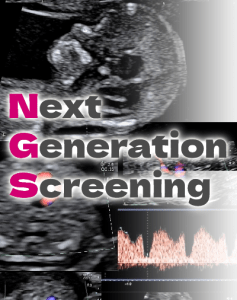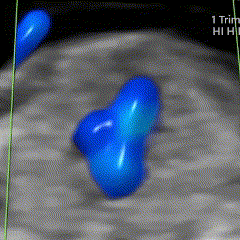
At our DEGUM II gynaecology and prenatal diagnostics practice in Hamburg Rahlstedt, we specialize in ultrasound examinations and other advanced diagnostic and therapeutic procedures in the first trimester of pregnancy.
The development of the organs in the embryo is gradual and each organ has its own timeline and growth pattern. In general, however, some important milestones in organ development can be identified at different weeks of pregnancy:
3rd-4th week of pregnancy: Development of the neural tube (from which the brain and spinal cord later develop) and the heartbeat.
5th-6th week of pregnancy: formation of the basic structures for the brain, spine, kidneys, lungs, digestive tract and heart valves.
7th-8th week of pregnancy: development of arms, legs, fingers and toes.
9th-12th week of pregnancy: formation of the reproductive organs, development of the nerve tracts and muscles.
13-16 weeks of pregnancy: development of the digestive organs, lungs and urinary system.
The frequency of malformations can vary greatly depending on the type of malformation. Some malformations are very rare and occur in less than 1 in 10,000 births, while others are more common and can occur in around 1 in 100 births. Some of the most common malformations are heart defects, cleft lip and palate and neural tube defects. It is important to note that the frequency of malformations can also depend on various factors such as genetic predispositions, environmental factors and other influences.
Prenatal diagnostics (prenatal diagnosis of the fetus) in the first trimester is a medical examination that is carried out during the first three months of pregnancy (the first trimester) to monitor the health of the fetus and the course of the pregnancy. There are various types of prenatal tests that can be carried out during this period.
In the first stage of pregnancy (11+6 – 13+6 weeks’ gestation), two non-invasive procedures are most commonly performed.
The extended first trimester screening incl. early fine diagnostics (exclusion of fetal malformations), fetal echocardiography (exclusion of congenital heart defects) and pre-eclampsia screening (screening for pregnancy toxemia) as well as the non-invasive prenatal test (NIPT – cff DNA).
It is important to note that these examinations are not always necessary and are usually carried out on the basis of risk factors or the parents’ wishes. The decision as to whether and what type of prenatal diagnostics should be carried out is made on the basis of a detailed examination. Advice is given to take into account the individual needs and risk factors of pregnant women.
The extended first trimester screening includes the so-called “nuchal fold measurement”, assessment of the visualization of the nasal bone, ductus venosus measurement (blood flow in a liver vessel of the fetus), assessment of the tricuspid valve (heart valve between the right atrium and ventricle) and pre-eclampsia screening (calculation of the probability of “pregnancy poisoning” in the current pregnancy). At the time of first trimester diagnostics, sonographic Doppler measurements in combination with other anamnestic and laboratory chemical parameters can detect around 90% of pre-eclampsia threatening to occur in later pregnancy at an early stage. In such cases, drug therapy is recommended, which significantly reduces the risk of developing pre-eclampsia or placental insufficiency. The extended first trimester screening is carried out in our practice according to the criteria and with the certification of the Fetal Medicine Foundation London. This means that advice, execution and evaluation are carried out exactly according to the guidelines of the London Research Group.
With this test it is possible to examine the circulating fragments of the genetic material of the unborn child or the placenta (the so-called cell-free DNA; cff-DNA) by taking maternal blood samples from 9+0 weeks’ gestation. The test accuracy for the trisomies mentioned is very high, even over 99% for trisomy 21. The test is useful for women who have an increased risk of trisomy 21, 13 or 18 and would like to avoid an amniocentesis or chorionic villus sampling if possible. According to international guidelines, it is recommended that a detailed ultrasound examination by an experienced examiner be carried out first between 11+0 and 13+6 weeks’ gestation. This means that much more common (approx. 10x) structural malformations in children can be ruled out. In such cases, cf-DNA testing is not suitable for a comprehensive clarification. On 01.07.2022, the NIPT was included in the service catalog of the statutory health insurance companies (possible after detailed consultation and if indicated).
Next Generation Screening is the latest and most comprehensive prenatal diagnostic procedure in the 1st trimester. It includes the complete first trimester diagnostics according to FMF London incl. Pre-eclampsia screening and advanced ultrasound examinations according to DEGUM and ISUOG with fetal echocardiography, supplemented by non-invasive fetal DNA diagnostics (NIPT). We look forward to advising you personally – also possible without an appointment with a short waiting time.



Pre-eclampsia is a serious pregnancy-related illness characterized by a high increase in blood pressure and damage to organs such as the liver, kidneys and placenta. Risk factors include maternal age over 40, a BMI over 35, the presence of pre-eclampsia in a previous pregnancy or in the mother’s family. Various screening methods are used to detect and treat pre-eclampsia at an early stage.
In Hamburg Rahlstedt, we offer an examination for the early detection of pre-eclampsia. The extended first trimester screening is carried out here, in which PLGF is also determined. In addition, the blood flow in two maternal vessels is measured to determine a risk factor for the disease.
If this risk factor is conspicuous, the ASPRE study recommends taking 150 mg of aspirin per day to prevent the occurrence of pre-eclampsia. This treatment has proven to be effective in 2/3 of cases and can help to prevent the disease before the 37th week of pregnancy.
Preventive measures are therefore available to pregnant women to minimize the risk of pre-eclampsia and protect the health of mother and child. We recommend that you contact us if you have any questions or uncertainties.
According to several scientific studies, sonographic examinations pose no risk to you or your child. We carry out every prenatal diagnostic examination in our practice according to the ALARA principle (As Low As Reasonably Achievable). Thanks to state-of-the-art technology and the examiner’s extensive experience, we are able to minimize exposure to ultrasound waves without compromising diagnostic accuracy.
In addition to competent and comprehensive advice and treatment, we attach great importance to customized, individual medicine.
Are you looking for modern first trimester diagnostics in Hamburg? Then you have found the right address! If you have any further questions, Dr. Czugalinski will be happy to help you.
We look forward to seeing you!